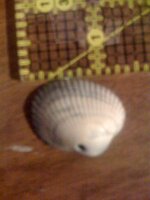- Joined
- Oct 15, 2011
- Messages
- 258
So, very once in a while I get a chance to go to near the shore on the eastern coast. I got a chance to collect this particular shell at Myrtle Beach. I've seen this is what is left after an octopus has drilled into clams, scallops, etc when they can't pry it open. What do you think, what are your thoughts on this shell, I'm really excited to see whether this shell WAS really the remains of a victim of octopus shell drilling. About 1" long in length and the hole is located in the back part of the shell. The diameter of the hole is about a millimeter and a half.



 Twice!
Twice!